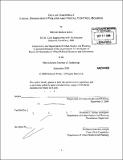| dc.contributor.advisor | J. Phillip Thompson. | en_US |
| dc.contributor.author | Kobes, Deborah Isadora | en_US |
| dc.contributor.other | Massachusetts Institute of Technology. Dept. of Urban Studies and Planning. | en_US |
| dc.date.accessioned | 2010-05-25T20:51:48Z | |
| dc.date.available | 2010-05-25T20:51:48Z | |
| dc.date.copyright | 2009 | en_US |
| dc.date.issued | 2009 | en_US |
| dc.identifier.uri | http://hdl.handle.net/1721.1/55132 | |
| dc.description | Thesis (Ph. D.)--Massachusetts Institute of Technology, Dept. of Urban Studies and Planning, 2009. | en_US |
| dc.description | Cataloged from PDF version of thesis. | en_US |
| dc.description | Includes bibliographical references (p. 325-364). | en_US |
| dc.description.abstract | The nation's current recession has strained the finances of local governments such that many cities with already delicate budgets have plunged into fiscal crisis. This dissertation examines three causes of fiscal crisis - a local government's dependence on the market, majoritarian tyranny within federalism, and local democracy failure. Since New York City's highly publicized board in 1975, 119 municipalities of all sizes have been assigned control boards, in which a state appointed team oversees the budgetary decisions of a municipality in fiscal emergency. This study analyzes how control boards address each cause of fiscal crisis. This research builds on the fiscal crisis literature to measure the fiscal impact of control boards. Evidence suggests that boards were implemented in most large cities with fiscal crisis and that those cities recover. However, crisis cities without control boards also improve. Regressions indicate that control boards in municipalities with populations below 25,000 are less successful. The control boards are not assigned to municipalities that most need intervention, and they do not improve fiscal outcomes more than similar cities. This dissertation explores the governance implications of control boards through a framework developed about International Monetary Fund stabilization teams. The literature suggests these institutions can bring technical expertise to ill-equipped governments; offer credibility to governments needing access to resources; and provide a scapegoat for unpopular policies. Conversely, disadvantages include diminished sovereignty; power to external political actors; favorable concessions to the private market; and uncertain benefits. | en_US |
| dc.description.abstract | (cont.) Case studies of Miami and Washington, DC between 1995 and 2001 highlight the fiscal and local democracy benefits of control boards as well as their risk of exacerbating an intergovernmental political imbalance. State and local leaders set a cooperative tone in Miami that increased local buy-in and bolstered long-term success. The credibility of DC's board helped the city obtain resources from Congress, but the real and perceived threat to local democracy was much stronger in the District than Miami and exacerbated by the control board's expansive powers. Thus, controversy throughout DC's control board era distracted from the board's goals and reduced its long-term impact. | en_US |
| dc.description.statementofresponsibility | by Deborah Isadora Kobes. | en_US |
| dc.format.extent | 364 p. | en_US |
| dc.language.iso | eng | en_US |
| dc.publisher | Massachusetts Institute of Technology | en_US |
| dc.rights | M.I.T. theses are protected by
copyright. They may be viewed from this source for any purpose, but
reproduction or distribution in any format is prohibited without written
permission. See provided URL for inquiries about permission. | en_US |
| dc.rights.uri | http://dspace.mit.edu/handle/1721.1/7582 | en_US |
| dc.subject | Urban Studies and Planning. | en_US |
| dc.title | Out of control? : local democracy failure and fiscal control boards | en_US |
| dc.type | Thesis | en_US |
| dc.description.degree | Ph.D. | en_US |
| dc.contributor.department | Massachusetts Institute of Technology. Department of Urban Studies and Planning | |
| dc.identifier.oclc | 598418391 | en_US |
